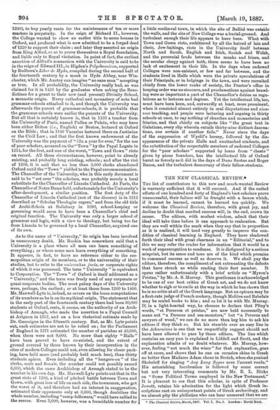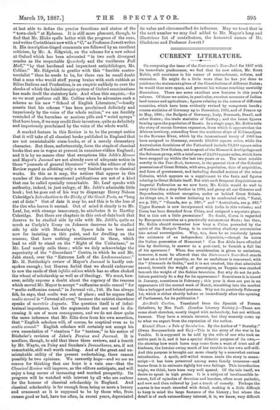THE NEW CLASSICAL REVIEW.* THE list of contributors to this
new and much-wanted Review is warranty sufficient that it will succeed. And if the united efforts of one hundred and forty of England's best scholars prove unsuccessful, their failure will be fraught with a lesson which, if it must be learned, cannot be learned too quickly. We welcome the Classical Review, therefore, with great joy, and decline to doubt that merited success will, in the end, crown its career. The editors, with modest wisdom, admit that their ideal will take time before it can approach to realisation. But they are well within the mark when they say that in proportion as it is realised, it will tend very greatly to improve the con- dition of classical learning in England. They have shadowed forth their ideal with great clearness in an "Editorial," and to this we may refer the reader for information that it would be a work of supererogation to condense. It is disfigured by a serious misprint, but its sense and tone are of the kind which promise to command success as well as deserve it. We shall pay the editors, therefore, the compliment of not extenuating the defeats that have struck us while reading their first number. It opens rather unfortunately with a brief article on " Myron's Priatae," by Mr. A. S. Murray. This gentleman is acknowledged to be one of our best critics of Greek art, and we do not know whether to sigh or to smile at the way in which he has shown that he is no critic at all of the Greek language. But an epicure may be a first-rate judge of French cookery, though Moliere and Rabelais may be sealed books to him ; and so let it be with Mr. Murray. If, in a light-hearted way, he chooses to declare that Pliny's words, "et Perseum et pristas," are now held necessarily to mean not "a Perseus and sea-monsters," but "a Perseus and sawyers of wood," we can do no more than beg him to ask his editors if they think so. But his stumble over an easy line in the Acharnians is one that we respectfully suggest should not have been allowed to pass by those editors. The line which contains an easy pun is explained in Liddell and Scott, and the explanation admits of no doubt whatever. Mn. Murray, how- ever, feeling "not much the wiser" for that explanation, goes off at score, and allows that he can on occasion shine in Greek no better than Madame Adam shone in Scotch, when she praised Skobeleff for singing "Aug Lang Sygne avec l'accent vonlu." His astonishing lucubration is followed by some correct but not very interesting comments by Mr. E. L. Hicks on "Some Political Terms employed in the New Testament." It is pleasant to see that this scholar, in spits of Professor Jewett, retains his admiration for the light which Greek in- scriptione cast on unimportant points of Greek archaeology, and we almost pity the philistine who can hear unmoved that we are
• The Claesicaj Reehnodliarch,1887. Vet I. No. L London, David Nutt.
at last able to define the precise functions and status of the " town-clerk" at Ephesus. It is still more pleasant, though, to find that Mr. Hicks spells better with the progress of the suns, and writes Corinthians now with a "C," as Professor Jowett writes it. His inscription-tinged comments are followed by an excellent criticism, by Mr. A. Sidgwick, on the scheme for a new school at Oxford which has been advocated "in two such divergent oracles as the respectable Quarterly and the vociferous Pall Mall," "by that hardened and impenitent antiphilologer, Mr. Collins." Mr. Sidgwick is gentler with this" forcible contro- versialist " than he needs to be, for there can be small doubt that a man who would stuff young brains with such rubbish as Silius Rams and Prudentius, is an empiric unlikely to cure the shocks of which the kaleidoscopic system of Oxford examinations has made itself the statutory heir. And when this empiric,—for so we must perforce call Mr. Collins when he advocates such a scheme as his new "School of English Literature,"—londly asserts that his scheme "has been proclaimed definitely and imperiously by the voice of the whole nation," we are forcibly reminded of the harmless or noxious pills and "weird syrups" that have been, if we may credit their inventors, quite as definitely and imperiously proclaimed by the voice of the whole world.
A marked feature in this Review is to be the prompt notice that it will take of all classical books published in England that are not unmistakable cram-books, or of a merely elementary character. But these, unfortunately, form the staple of classical books that are in vogue at present in examiner-ridden England ; and it is by no means clear that exceptions like Jebb's Homer and Mayor's Juvenal are not already sure of adequate notice in those "journals of general literature" which the editors of this Review regard as allotting only a very limited space to classical works. Be this as it may, the notices that appear in this number of the above-mentioned publications are not of a kind that can be called specially remarkable. Mr. Leaf speaks with authority, indeed, in just eulogy, of Mr. Jebb's admirable little book ; but he goes out of his way to disparage Henry Nelson Coleridge's Introduction to the Study of the Greek Poets, as "long out of date." Out of date it may be, and this is to the loss of the tiro who leaves it unread. Out of mind it clearly is to Mr. Leaf, for, with strange inaccuracy, he attributes it to Hartley Coleridge. But there are chapters in this out-of-date book that deserve to be studied side by side with Mr. Jebb's, quite as much as Carlyle's Essay on Johnson deserves to be studied side by side with Macaulay's. Space fails us here and now for insisting on this point, and for dwelling on the reasons, that have nothing sentimental in them, which lead us still to stand on the "Right of the Unitarians," as Mr. Leaf neatly calls them ; while we duly acknowledge the superiority of the " discordant " Centre, in which he and Mr. Jebb stand, over the "Extreme Left of the Lachmannianer." Mr. H. Rettleship's review of Mayor's juvenal is hardly out- spoken enough ; but Heaven forbid that we should endeavour to sow the seeds of that infelix odium which has so often choked the wheat of scholarship as well as of theology. We must, how- ever, mildly express a doubt about the cogency of the reasons which moved Mr. Mayor to accept " salamine mulio consul" for " multo suffitamine consul," in Juvenal viii., 148. He has always felt, he says, that multo was out of place ; and he argues that onslio consul is " Juvenal all over," because the satirist elsewhere speaks of meretrix Augusta. The question itself is of infini- tesimal importance, but the arguments that are used in dis- cussing it are of more consequence, and we do not draw quite the same inference that Mr. Ellis does from his own assertion, that "English scholars will, of course, be sceptical even as to mulio consul." English scholars will certainly not accept his own emendation of " &Lantern " for " tantum," in his notice of Bficheler's revision of Jahn's Persius and Juvenal. It is needless, though, to add that these three reviews, and a fourth by Mr. Wayte, on Paley and Sanders's Demosthenes, are, if not remarkable, still well worth reading. And of the great and un- mistakable utility of the present undertaking, there cannot possibly be two opinions. We earnestly hope—and we see no reason for thinking that our hope is a vain one—that the Clasaical Review will improve, as the editors anticipate, and will enjoy a long career of increasing and merited prosperity. Its progress will be watched with interest by all who are zealous for the honour of classical scholarship in England. And classical scholarship is far enough from being so mere a luxury and ornament as it is supposed to be by those who, from causes good or bad, have too often, in recent years, depreciated
its value and circumscribed its influence. May we trust that in the next number we may find added to Mr. Mayor's long and illustrious list of contributors, the honoured names of Mr. Gladstone and Professor Jowett ?



































 Previous page
Previous page